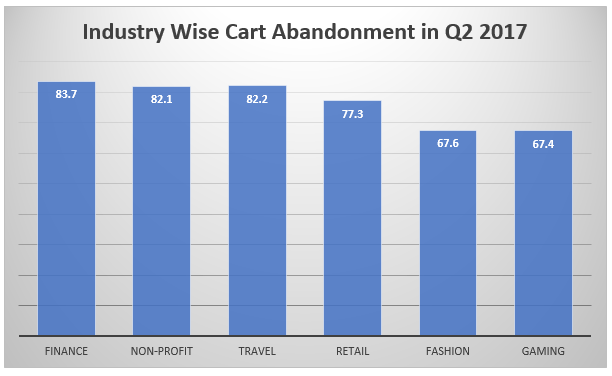Companies have reportedly lost over $18 billion in revenue, with products worth over $4 trillion being abandoned in 2017. To make matters worse, cart abandonment rates have significantly increased from 62.30% in 2014 to 76.9% in Q2 2017. By industry, here are some more numbers: 
Cart abandonment is inevitable and unavoidable. It's also a unique opportunity for marketers to touch base with customers and engage with them on a more personal level. Sending appropriate reminders to customers in the form of timely cart abandonment emails can help email marketers win back some of these customers-after all, 75% carts are abandoned with the intent to return.
If it's true that 75% carts are abandoned with the intent to return, this should mean that the customer is inclined to purchase your products but need a push to get themselves over the hump. That hump could range from high shipping costs to lack of proper payment options, or even something as simple as they got distracted. (Customers are humans after all).
Email marketing is the perfect tool with which you can battle cart abandonment. Whether you're already sending some form of cart abandonment emails or not at this juncture, let's take a look at...
6 ways to improve re-engagement via cart abandonment emails
1) Include Personalization
Most email marketers tend to overlook the importance of personalization in emails. As per Barilliance, only 19% of marketers are actually implementing personalization. Personalization can be mean a lot of things, but a simple start is the use of a first name in the email. Having that simple use of a first name-or further personalization-can show you value your customer. 
In the above email by Ghurka, the customer is addressed by their first name, thus (hopefully) drawing them into a direct conversation. (Source: Pinterest)
2) Remind Customers of Their Cart Emails
Visitors who abandoned the cart may not remember about their abandonment and therefore need to be gently reminded of what's in their carts. Including the image(s) of the product(s) in the cart helps your prospective customer make a quicker connection to their abandoned purchase and may be more inclined to return.
SIDE NOTE: This is also an excellent opportunity to cross-sell relevant products related to what is in the cart.
In the above email sent by Pinterest, the user is shown the picture of the product that was left in their cart with a connecting CTA button. (via Really Good Emails)
3) Offer Incentives to Drive Sales
People love discounts. (I know, novel concept, right?)
Offering a small incentive like a 10% discount or free shipping may be enough to drive abandoners to finish their purchase. That said, don't be too quick to use an incentive. Try simple reminders first. Your bottom line/profit margin may thank you.
While not a special incentive in this case, this Kate Spade cart abandonment email reminds the recipient about shipping and returns being free of cost. (Source: Ometria)
4) Use Strong CTAs
Your call to action is where the magic happens. So, it's crucial that your CTA accurately and succinctly reflects your messaging and drives home what you want your recipients to do.
In this Bonobos example, the email copy talks about the different ways the customer can seek help from them and the CTA copy is actionable, relevant, and concise. (Source: Pinterest)
5) Consider Your Frequency & Timing
As with all messaging, timing is critical in cart abandonment. Per MIT, 90% of leads go cold within an hour of abandonment. So, your (first) reminder email needs to be sent within an hour of cart abandonment. Any follow-up emails sent 24 and 48 hours after abandonment can help to recover an additional 50% of abandoned carts as well.
If you're working on a multi-email cart abandonment series, your general flow of messaging could be:
- We saved your cart
- Your cart item(s) are saved but not for long
- Here is a discount or free shipping (Notice how this is NOT included in the first email)
- Are you still interested?
6) Include Customer Testimonials
Word of mouth is still the best marketing channel around. Pull reviews from your website-heck, even link to a third-party review if you want-and include these testimonials in your cart abandonment emails. They'll help build trust and hopefully drive more conversions.
Casper's Cart abandonment email (Source: SleekNote)
Wrapping Up
Consider cart abandonment as a valuable opportunity to re-engage with your customers and make use of the above-mentioned tips to use email marketing to win back customers.What cart abandonment email marketing tips to do you have?About the Author: Scott Cohen is the VP of Marketing at InboxArmy, a full-service email marketing agency. He has been living and breathing email marketing since 2007. Scott brings a unique perspective to email marketing that combines best practices with real-world-tested strategy and tactics. Check out Scott's email marketing tutorials & articles on Inbox Army's Email Marketing Blog.
